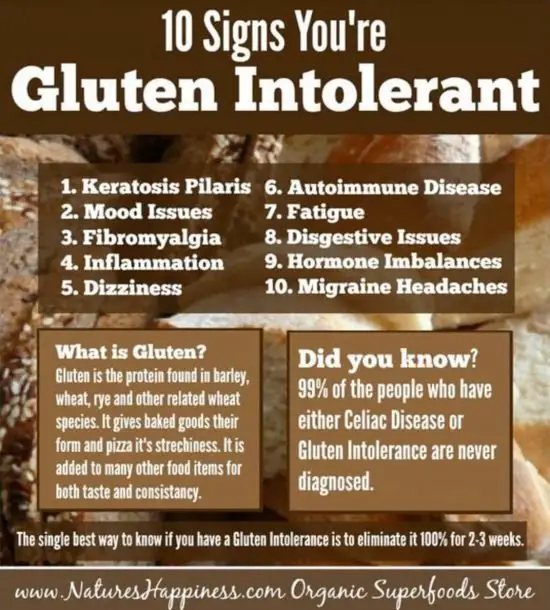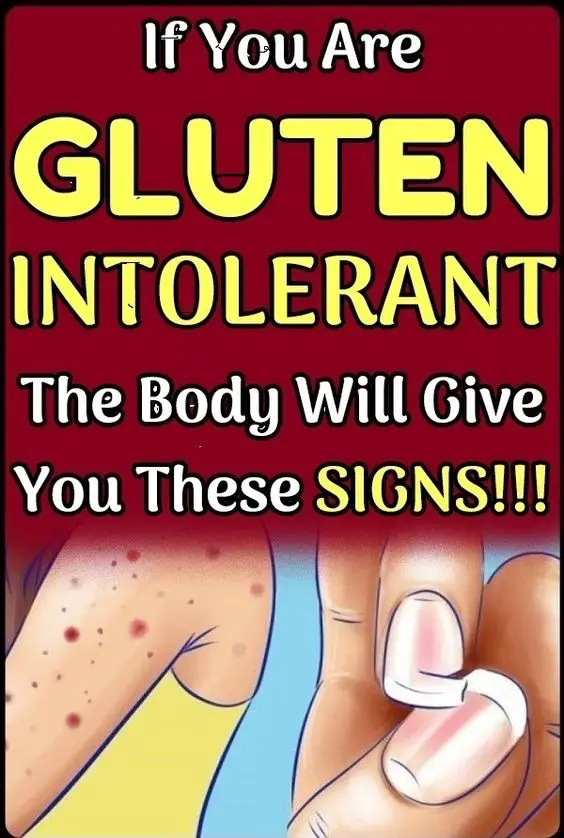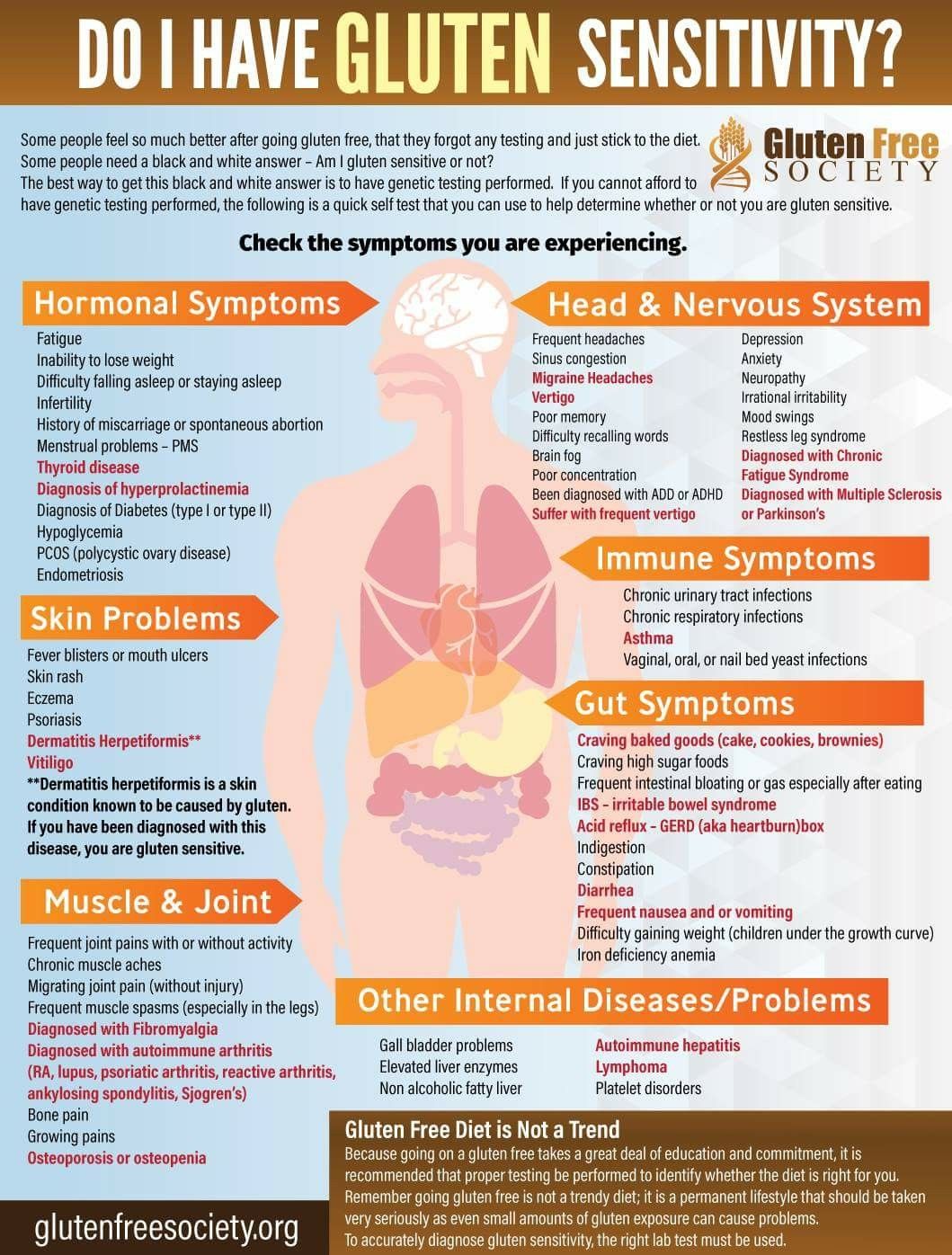Some Of The Most Common Symptoms Of Gluten Sensitivity Are:
1. Digestive Problems Including gas, abdominal pain, bloating, and IBS.
2. Cognitive Issues Such as an inability to focus, dizziness, tingling sensations in the extremities, and brain fog.
3. Extreme Fatigue If you become abnormally tired during the day, this is often a sign of gluten sensitivity.
4. Symptoms of Fibromyalgia Although some doctors will deny it, the weakness and skeletal pain that most people call fibromyalgia is actually a sensitivity to gluten.
5. Hormonal Imbalance If you suffer from PMS, extreme menopause symptoms, or unexplained fertility problems, you could have a gluten sensitivity.
6. Joint Pain and/or Inflammation Many people who are suffering from inflammation or joint pain do not have arthritis or other issues, they are simply overly sensitive to gluten, or they are allergic to gluten.
7. Emotional Issues Depression, drastic mood swings, panic attacks or extreme feelings of anxiety when there is no cause for such feelings might be a gluten sensitivity.
8. Frequent Headaches and/or Migraines
9. Skin Rashes Unexplained rashes or other types of skin problems, such as psoriasis or eczema.
10. Keratosis Pilaris This is another type of skin issue that many people who have a gluten sensitivity develop. This skin issue causes rough, discolored bumps and/or hardened patches of skin, usually around the arms, thighs, or even on the cheeks of the face.
Continue to Page 3
What Does A Gluten Intolerance Feel Like
Screenings suggest 1 in 100 people have coeliac disease in the UK, but only 24% of people with the condition are clinically diagnosed. This makes it much more common than previously thought. Coeliac disease is an autoimmune disease. Its often the most severe form of gluten intolerance. In extreme cases, it causes damage to the digestive system, malnutrition, and osteoporosis. But, non-coeliac gluten sensitivity causes symptoms often identical to those of coeliac disease. The difference between the two conditions is the process your body undergoes when reacting to gluten.
The reason why a lot of gluten intolerance goes undiagnosed is due to the wide-ranging symptoms which vary between individuals. The symptoms of gluten intolerance sometimes dont have anything to do with digestion. This means making the connection between what you are feeling and what you are eating is more difficult than you think. Below are some of the common symptoms that could signal you are experiencing gluten intolerance.
You Often Experience Rashes And Itchy Skin
Skin conditions associated with intestinal diseases are becoming more frequent.
New research suggests that NCGS can cause skin lesions similar both to eczema and psoriasis, particularly on the elbows, back of hands and knees.
In a study of 17 patients, a gluten-free diet greatly improved symptoms after just one month .
Research is in its early stages though, and its unclear if gluten is a direct cause of these conditions, or simply worsens them.
Also Check: Dr Schar Gluten Free Bread
Think You Have Gluten Sensitivity Heres What To Do Next
There are quite a few people out there who would tell you that you should just go gluten-free and never look back if you find that gluten does indeed cause a problem. I dont quite agree with that sentiment and Id say that this point is one of my biggest regrets looking back regarding my gluten-free journey.
Because some estimates states that up to 83% of those with celiac disease are still undiagnosed and that it can take an average of 4 years to finally get a diagnosis, I do recommend if you find that you react to gluten to go get tested for celiac disease. The reason is that celiac can be a serious, life-altering autoimmune disease that further increases your risk of developing additional autoimmune diseases and even cancer.
By not getting tested and assuming that what you have is gluten sensitivity may not be accurate. This essentially clouds your ability to know exactly whats going on with your body and what risk factors may be down the road that you should be aware of. Maybe you can stave them off, maybe not. Either way, having that knowledge and knowing if your issues stem from your body stumbling into a state of autoimmunity is critical.
And one more thing Compliance with the diet is a major problem for people in our community who need to be gluten free.
Unfortunately many are still struggling even longer . Thats an awfully long time to 1) continue to feel like dirt and 2) not give your body a break.
Treating Symptoms Of A Gluten Allergy

The best and really only known effective treatment for wheat or gluten allergies, gluten intolerance and celiac disease is to follow a strict gluten-free diet. This means removing all gluten containing grains and products made from these grains from your diet. In addition, you will need to start monitoring labels for gluten, as it is often used as a filler or binder in products such as barbecue sauces and vitamin supplements.
I also recommend integrating gluten-free enzymes, probiotic supplements and vitamin D into your diet. Vitamin D is one of the first vitamin deficiencies associated with gluten intolerance and more and more research seems to indicate a change in intestinal bacteria is associated with people suffering from many autoimmune diseases . But none of these are a replacement for a strict gluten-free diet, which is a must. They are just a supplement to help with recovery. As I mention in my gluten allergy symptoms in adults article, you might have a blood panel done to help you determine any vitamin and mineral deficiencies.
While this may sound daunting at first, after a short period of time youll soon discover how many gluten-free products are now on the market. With a positive attitude and a willingness to explore new foods you will find that living gluten free is not as difficult as you first imagined.
Also Check: Betty Crocker Gluten Free Cookie Mix
What Causes Coeliac Disease
Coeliac disease is an autoimmune condition. This is where the immune system mistakenly attacks healthy tissue.
In coeliac disease, the immune system mistakes substances found inside gluten as a threat to the body and attacks them.
This damages the surface of the small bowel , disrupting the body’s ability to take in nutrients from food.
It’s not entirely clear what causes the immune system to act this way, but a combination of genetics and the environment appear to play a part.
How Do You Get Tested For Gluten Sensitivity
As of now, there are no methods to test or diagnose for non-celiac gluten sensitivity. Some doctors recommend saliva, stool, or blood testing. However, none of these tests are validated or accepted.
Since no antibodies in the blood are sensitive or specific enough for NCGS, no antibodies in the patients saliva, stool, or blood can help screen or diagnose this condition.
Thus, currently, the only appropriate way of diagnosing non-celiac gluten sensitivity is through exclusion. Medical experts recommend you get tested for gluten intolerance, wheat allergy, and gluten allergy.
If all tests come back positive and you experience similar symptoms, youre likely to have gluten sensitivity. After this, your doctor will help you curate a gluten-free diet.
Read Also: Is There Gluten In Peanut Butter
You Have An Autoimmune Disease
An autoimmune disease is the term given when your immune system mistakenly attacks and damages your own tissue.
There are more than 80 types, characterised by which tissues or organs in the body are damaged.
Gluten intake is consistently linked with numerous types, but whether its the cause remains to be seen. Its influence in Celiac disease is the obvious example, but research indicates gluten likely affects Hashimotos hypothyroidism and Graves disease, to name a few.
Some researchers speculate the potentially negative effect of gluten is to do with the effect that gliadin may have on gut health and function .
In any case, it seems gluten intolerance is more likely in those with an autoimmune condition.
How To Know If You Have Celiac Disease A Gluten Sensitivity Or A Wheat Allergy
5 min Read Time
Odds are, someone you know has gone gluten-free. Perhaps theyre trying to drop some pounds, or simply believe its healthier for them. Or, maybe they suspect they have a gluten-related medical problem, since theyve linked eating it to uncomfortable or distressing symptoms like nausea, fatigue or even joint pain.
Its possible, of course. Millions of people have disorders, such as celiac disease or gluten sensitivity, involving negative reactions triggered by gluten intake. Plenty of others have a wheat allergy, a potentially life-threatening immune response thats often confused with gluten-related illnesses.
But, while these serious medical issues demand the avoidance of certain foods, avoiding gluten isnt necessary for many people. Theres no proof that it helps you lose weight, for example and cutting it out of your diet unnecessarily may trigger a different set of health issues.
So, what is gluten, and how do you know if you have a serious problem with it? Whats the difference between conditions linked to gluten and wheat? And when is it a good idea to keep gluten as part of your diet?
Recommended Reading: Gluten Free Pancake Mix Just Add Water
What Causes Ncgs And How Many Are Affected
More research is needed to figure out what leads to NCGS: It’s unclear whether there is a genetic component or lifestyle or demographic risk factors. We’re also not sure if it carries long-term complications or if it’s linked to any other conditions. Until that 2016 study out of Columbia University suggested otherwise, the general belief was that NCGS did not trigger either an immunological response or intestinal damage. Still, the evidence is not definitive and as Keatley says, “NCGS is defined by its symptoms more than any measurable signs of disease.”
What Exactly Is Gluten
Contrary to what you might think, gluten is not a substance found naturally in grains! From the Latin glutinium meaning glue, gluten actually signifies the elastic network that forms when certain types of flour come into contact with water. Invaluable in baking, gluten is integral to the process of bread-making, as it enables dough to rise.
On a molecular level, gluten is primarily composed of two large groups of grain proteins, prolamins and glutelins. So its as a result of metonymy that the term gluten is nowadays understood as these particular protein fractions found in certain grains.
An easy way to remember the main grains that contain gluten is by thinking of the acronym BROWS: Barley, Rye, Oats, Wheat, Spelt.
Recommended Reading: Gluten And Dairy Free Icing
What Are The Symptoms Of Coeliac Disease
The symptoms of coeliac disease can range from severe to minor or atypical, and may even go undetected. Some symptoms can be wrongly confused with irritable bowel syndrome or a sensitivity to wheat or other food, while other symptoms may be put down to stress or getting older.
The most common symptoms of coeliac disease in adults include:
- irritability.
How Is Gluten Intolerance Diagnosed

Your healthcare provider carefully reviews your symptoms and medical history. If they suspect you have a gluten intolerance, these are the next steps to confirm the diagnosis:
- Step 1: You eat a diet containing gluten for about six weeks. During this time, your healthcare provider performs blood tests and skin tests to rule out a wheat allergy or celiac disease. There isnt a gluten intolerance test.
- Step 2: If you dont have a wheat allergy or celiac disease, your healthcare provider will ask you to exclude gluten from your diet for at least six weeks. Keep a thorough record of your symptoms during this time, noting which symptoms improve.
- Step 3: If your symptoms do improve while youre on a gluten-free diet, you gradually reintroduce gluten back into your diet. If symptoms return, you likely have a gluten intolerance.
Don’t Miss: What Is The Best Gluten Free Flour For Baking
How Gluten Sensitivity Is Diagnosed
People with gluten sensitivity experience symptoms when they eat gluten. Gluten is a protein found in wheat, rye, and barley. These symptoms may include:
- Digestive issues
- Rashes or other skin problems
- Brain fog
- Joint pain
Getting a gluten sensitivity diagnosis isn’t always easy. There is evidence that non-celiac gluten sensitivity is a real condition, but many healthcare providers don’t believe in it. Doctors also don’t agree on how to test for this condition or how to interpret the tests.
Most doctors recommend celiac disease testingfirst if you think you are reacting to gluten. If your test results are negative, however, the next step may be to look for gluten sensitivity.
This article looks at gluten sensitivity and its diagnosis.
Can You Develop Gluten Intolerance In Your 20s
You can develop gluten intolerance when you are in your 20s. This condition can also occur when you are older.
If you are experiencing symptoms of gluten intolerance, make an appointment today with Gotham Gastroenterology. Our specialists can offer a diet plan tailored to your needs.
You Might Also Enjoy
Dont Miss: Gluten-free Substitute For Breadcrumbs In Meatloaf
Don’t Miss: Gluten Free Crescent Rolls Whole Foods
If You Have Any Of The Following Symptoms You May Have Gluten Intolerance:
1. Digestive issues such as gas, bloating, diarrhea, and even constipation after eating gluten.
2. Keratosis Pilaris, also known as chicken skin on the back of your arms. This tends to be a result of a fatty acid deficiency and vitamin A deficiency secondary to fat-malabsorption caused by gluten damaging the gut.1
3. Fatigue, brain fog, or feeling tired after eating a meal that contains gluten
4. Diagnosis of an autoimmune disease such as Hashimotos thyroiditis, Rheumatoid arthritis, Ulcerative colitis, Lupus, Psoriasis, Scleroderma, or Multiple sclerosis.
5.Neurologic symptoms such as dizziness or feeling of being off-balance
6. Hormone imbalances such as PMS, PCOS, or unexplained infertility
7. Migraine headaches
8. Diagnosis of chronic fatigue or fibromyalgiathe diagnoses simply indicate your conventional doctor cannot pinpoint the cause of your fatigue or pain.
9. Inflammation, swelling, or pain in your joints such as fingers, knees or hips.
10. Mood issues such as anxiety, depression, mood swings and ADD.
How Do People Know They Have It
Someone who has a lot of stomachaches, diarrhea, weight loss, or any of other symptoms of celiac disease should talk to a doctor. It may or may not be celiac disease, but a doctor can help sort this out and will usually order a screening blood test.
If the screening tests show a person might have celiac disease, the next stop usually is to see a gastroenterologist, a doctor who treats digestive problems. This specialist may decide to take a sample of the small intestine to look at under the microscope. This small sample is called a biopsy. If a biopsy is done, the doctor will give some special medicine to help the person stay comfortable during the procedure.
Read Also: Cauliflower Pizza Publix
You May Like: Why Is Gluten Bad For Weight Loss
What Should I Do If Im Exposed To Gluten
Gluten is in countless foods, drinks and other products. Even if you stick to a gluten-free diet, you might accidentally eat gluten at some point. If you experience side effects from accidental gluten exposure, you can:
- Drink plenty of water to flush out your system.
- Eat small meals that arent spicy or fatty.
- Try ginger or peppermint tea to soothe an upset stomach.
Damage To The Small Intestine From Coeliac Disease
The normal lining of the small intestine is covered with tiny, finger-like projections called villi. The cells on villi break down and absorb nutrients in food. If you have coeliac disease, the mucosa of your small intestine is damaged. This causes inflammation of the villi, referred to as villous atrophy. As a result of this inflammation, the surface area of your small intestine, which enables the absorption of nutrients and minerals, is seriously reduced. This can lead to nutritional deficiencies.
Recommended Reading: Udis Gluten Free English Muffins
The Truth About Gluten Intolerance
Gluten is the glue that holds it all together, and its a protein found in wheat, barley and rye. Meaning its found in foods you probably eat every day bread, pasta, crackers, cereals, salad dressings and more.
So what happens when your body has an intolerance or sensitivity to gluten? The results can be unpleasant, painful and downright dangerous to your long-term health. Heres what you should know about gluten intolerance.
Is It Coeliac Disease Or A Gluten Intolerance

One in 100 people are now diagnosed with coeliac disease, which is much more common than previously thought, while thousands more could have it and not realise.
Coeliac disease is an autoimmune condition. When sufferers eat gluten, the immune system overreacts and damages the finger-like protrusions in the small intestine called villi that help absorb nutrients. This can cause symptoms such as severe gut pain, weight loss and fatigue.
Left untreated, coeliac disease can lead to serious health complications including malnutrition and osteoporosis.
But you don’t have to have coeliac disease to develop symptoms from eating gluten. People who have a gluten intolerance or are sensitive to gluten can experience problems including abdominal pain, diarrhoea, fatigue and headaches.
You May Like: Kraft Macaroni And Cheese Gluten Free
What Causes Gluten Intolerance
The exact causes of gluten intolerance arent well understood. Some research shows that people may not be sensitive to gluten, but to a certain carbohydrate found in many foods. Their bodies dont absorb the carbohydrate as they should. It stays in their guts and ferments, causing sickness.
Other research suggests that wheat might affect the lining of some peoples digestive tracts. This lining usually keeps bacteria from leaking out of your intestines. But in people with a gluten intolerance, the lining may not work as it should, allowing bacteria into their blood or liver and causing inflammation.
